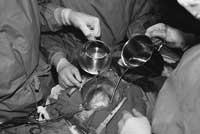Liver cells working outside the body
2001/04/05 Galarraga Aiestaran, Ana - Elhuyar Zientzia
Researchers at the University of California have managed to have liver cells live and function on silicon supports. Thanks to this, new ways are opened to combat liver diseases and to test drugs and drugs.
To produce these porous "liver bioreactors" of silicon as a coin, bioengineers and biochemicals have worked together. One of these researchers affirms that their achievement is an example of what collaboration between the different sections of science can do in favor of human health.
They work to keep human cells out of the body. The necessary supports are being tested for this, controlling its structure, temperature and medium chemical for cell growth. In addition, the installation of sensors allows to visualize the state of the cells through a monitor.

Previous research with porous silicon has been with cancer cells, but thanks to what has been achieved now, they can investigate conventional cells taken directly from the animal liver. In addition, in the future, the road for the manufacture of artificial livers is opened.
Currently, five companies are testing artificial livers. These are tools that contain hepatic or cancerous pork cells and are intended to help patients who expect a liver transplant. The silicon bioreactors that have now been invented will allow to develop new blood processing techniques.
Although cancer cells grow easily in cultures, the survival of normal cells is much more difficult. The researchers have tried that the porous bioreactor of silicon has the same conditions as the liver. Each cell is set in a proper structure closer than a hair and the skin can be chemically modified to resemble a liver extracellular matrix. By surface pores of silicon can pass food and chemicals, but is waterproof to viruses and bacteria.
Although the aim of the researchers is to obtain artificial liver, the first application of silicon bioreactors will consist in testing the toxicity of drugs. One of the most important functions of the liver is the division of drugs and drugs so they can act or be expelled from the body. Normally, the clinical value of a drug is determined after observing hepatic metabolism. If toxicity tests can be performed in the bioreactor, it is possible to avoid testing drugs in animals. In addition, it is possible to test drug interactions by placing two or more drugs in the bioreactor at a time.
On the other hand, on the silicon surface, instruments have been installed for the recognition and measurement of biomolecules, which allows to know if the cells are processing drugs. Using a laser they can also detect the smallest changes in metabolite receptors.
The silicon support developed has been an important step in obtaining artificial liver and in testing drugs without the need for live animals.

Gai honi buruzko eduki gehiago
Elhuyarrek garatutako teknologia





